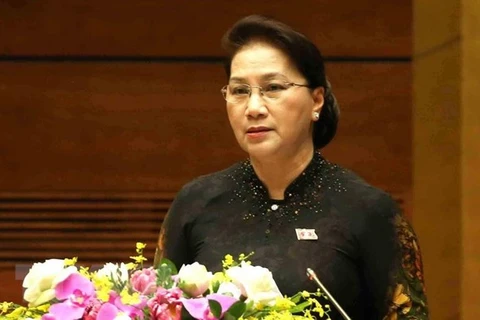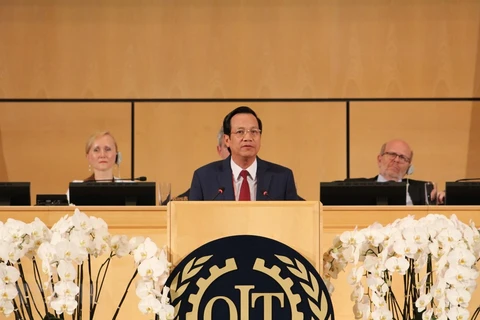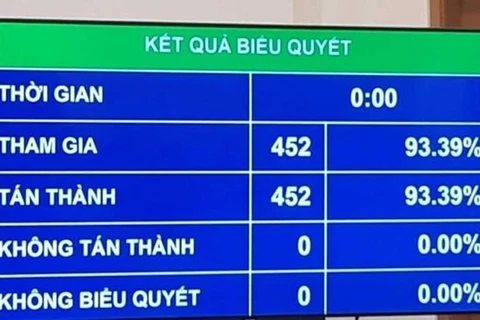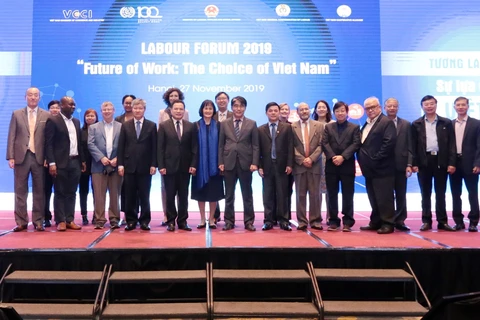Hanoi (VNA) - The adoption of the revised Labour Code by the National Assembly in November 2019 has created a better legal framework for employment relations and working conditions in Vietnam, experts have said.
Major amendments
Minister of Labour, Invalids and Social Affairs Dao Ngoc Dung said a number of new features are mentioned in the revised Labour Code, including historical issues and some which are expected to have impacts over the next few decades such as the adjustment of the retirement age, the development of employment relations in the context of market economy, and other matters relating to salaries and collective bargaining.
They are major and widely-affected issues, Dung said, adding that it is necessary to amend the law to suit the international practices and domestic situation.
Besides addressing restrictions, the revised Labour Code also focuses on implementing voluntary collective bargaining – an essential tool for a socialist-oriented modern market economy in the process of extensive and intensive global integration, he added.
Another big improvement is the expansion of the scope of the Labour Code to protect workers who are employed but have not been provided with written employment contracts.
“As a result of extensive consultation, the rights and duties of employers and workers are now clearer, while new rights and institutional processes have been created”, said International Labour Organisation (ILO) Vietnam Director Chang-Hee Lee.
The progress can be seen in new definitions for discrimination and harassment, and the permission given to workers to leave their jobs providing that they inform their employers in advance properly. The law also provides clearer guidance relating to forced labour and juvenile workers, which make it easier for employers to understand what is and is not permitted and should enhance the ability of labour inspectors to advise and enforce in these areas.
Creating foundation for international integration
The most important change in the revised Labour Code is the posibility of workers in enterprises to exercise their right to form or join a representative organisation of their own choice, which is not necessarily a member of the Vietnam General Confederation of Labour.
“Freedom of association is a fundamental right under the ILO’s 1998 Declaration on Fundamental Principles and Rights at Work. It helps improve the collective bargaining process that enables workers to get a fairer share of the profits and enterprises to negotiate the productivity improvements necessary for them,” Lee said.
Respecting ILO fundamental conventions is a central requirement of the new generation of free trade agreements, including the Comprehensive and Progressive Agreement for Trans-Pacific Partnership (CPTPP) and the EU-Vietnam Free Trade Agreement (EVFTA), as well as corporate social responsibility policies of many multinational corporations.
“The revised Labour Code, which paves the way for the move towards full realisation of the 1998 ILO Declaration, is so important because it provides a better legal framework for employment and industrial relations, and for equitable and sustainable growth, as Vietnam makes concerted efforts to become an upper middle income country,” Lee said.
“It will greatly contribute to the progressive realisation of decent work for all working women and men.”
The head of ILO Vietnam added that the significant progress in the revised Labour Code will substantially improve Vietnam’s employment and industrial relations and create a solid foundation for fair international integration and trade.
Major contents amended and supplemented in the new Labour Code include labour contracts, working time, maximum extra working time, salary, minimum wage, retirement age, anti-discrimination in the workplace such as gender, forced labour, and sexual harassment, prevention and elimination of child labour, holding dialogues at the workplace, collective bargaining, and mechanisms to address labour disputes./.
























